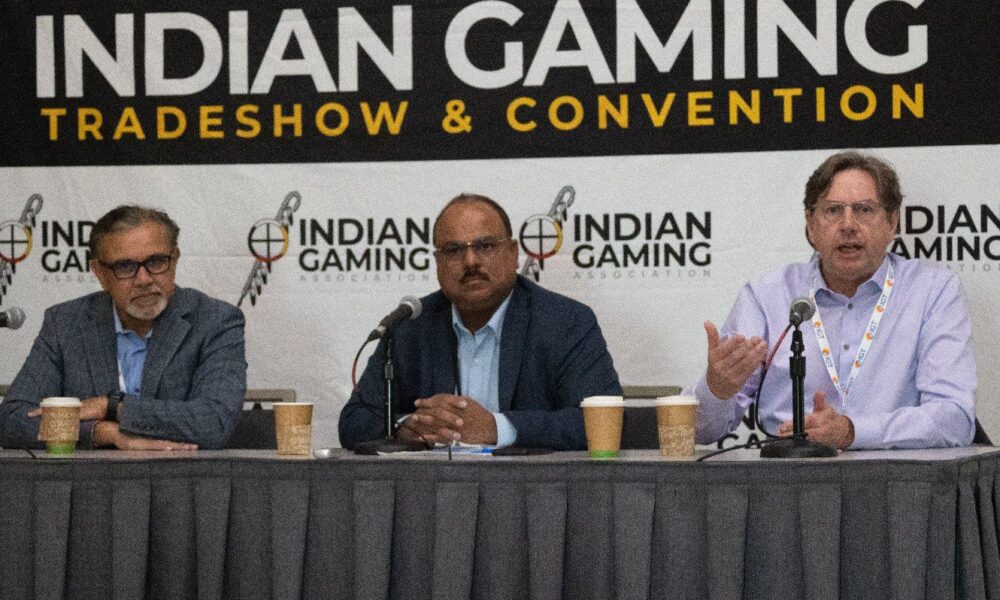In today’s competitive landscape, data is the key to optimizing operations and enhancing player engagement, according to a panel discussion on artificial intelligence at the Indian Gaming Tradeshow & Convention.
Tribal casinos can leverage AI, machine learning, and predictive analytics to improve marketing strategies, streamline decision-making, and maximize revenue. Real-time data insights can drive smarter promotions, optimize floor layouts, and enhance guest experiences.
Brian McDonald, an account executive at Salesforce, moderated the discussion that included Joe Stefaniak, CEO of IntelligentTag; Kiran Brahmandam, founder and CEO of Gaming Analytics Inc; and Manjit Singh, founder and CEO of DruvStar.
“We’re at the forefront of an exploding space,” McDonald said of artificial intelligence. “It’s not only revolutionizing the customer experience, but operational efficiencies.”
Stefaniak said AI is moving quickly in the industry. Two months ago, OpenAI released a reasoning model that allows thinking about data passing through it and providing answers and recommending what else can be done with the data.
“We’re seeing a technology independence relative to the AI model that allows us to scale more quickly than we ever thought possible,” Stefaniak said.
According to Brahmandam, when some people think of AI, they relate it to the movie Terminator and that technology is taking over the world.
“I define AI as anything that humans were doing, technology does it faster, much better, and at scale,” Brahmandam said. “Folks who primarily focus on how to their my business better can leverage the tech and make a lot more money. You spend a lot of time hiring people to write reports for you, but what if you could write a question and get an answer? You won’t fire the report writer, but now you can put that person onto other high-value tasks. We’ve seen 18% to 23% time savings.”
With AI, there have been “tremendous improvements” in slot optimization. On the marketing side, Brahmandam said it can improve how and when to reach out to customers to bring them to the property.
Stefaniak said AI can tell operators what asset changes have been made since a slot machine has been on the floor. It will take it a step further to identify what parts are failing the most and make staffing recommendations.
“The efficiency is not only client-facing but also a myriad of internal operational efficiencies,” Stefaniak said.
Singh said casinos have struggled with workforce development and the world is changing so that it’s not going to be knowledge-worker dependent in a decade. A person who is using AI and someone who isn’t will see a big disparity.
“I see a lot of enterprises having the use of AI for their employees, which is perfectly fine today, but that doesn’t take us into the future,” Singh said. “We have to develop guardrails, see what we’re comfortable with, and put a governance program around it to enable workforce development. I do see that the tribal communities will benefit greatly from AI in terms of knowledge and learning.”
Working with customers, Brahmandam has noticed a lot of opportunity for optimization. A typical casino spends tens of millions of dollars a year on marketing, but marketing expenses have dropped between 8% and 18%, while increasing player loyalty — some 75% in reactivation plays in one example in Washington state and a 44% increase in VIP players.
“We’ve seen that at multiple casinos,” Brahmandam said. “The way casinos measure the value of players today is 20 years old.”
When a casino is making money, people will question why they should change, but evidence from AI can change their mindset and make them realize they’re leaving money on the table, Brahmandam said.
How casinos define a player-life cycle is out of date, Brahmandam said. Properties put thousands of players into the same bucket and in some cases, they’re wasting money by marketing too aggressively. In others, they’re reaching out too late and losing them to the competition.
“We’ve seen about 13% to 33%, depending on the market and casinos, where by proactively defining the life-cycle stage of the player based on each’s behavior, we were able to generate significant ROI,” Brahmandam said.
There are challenges, however, Brahmandam added. AI can make a slot recommendation and while some properties make the change the next day, others have to go through a process and get approval that takes 30 to 45 days.
“You can have software that gives you good recommendations, but while you’re taking time to act on it, some people may not think the software isn’t doing anything for them,” Brahmandam said.

